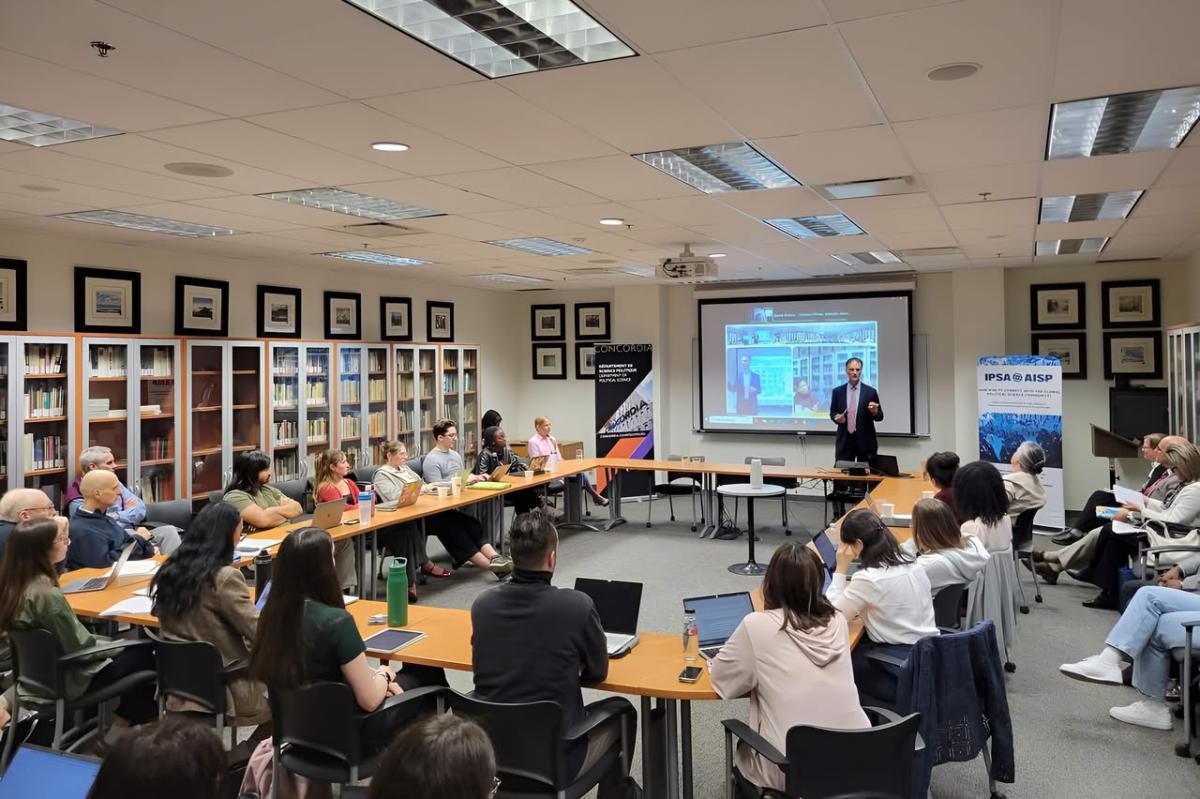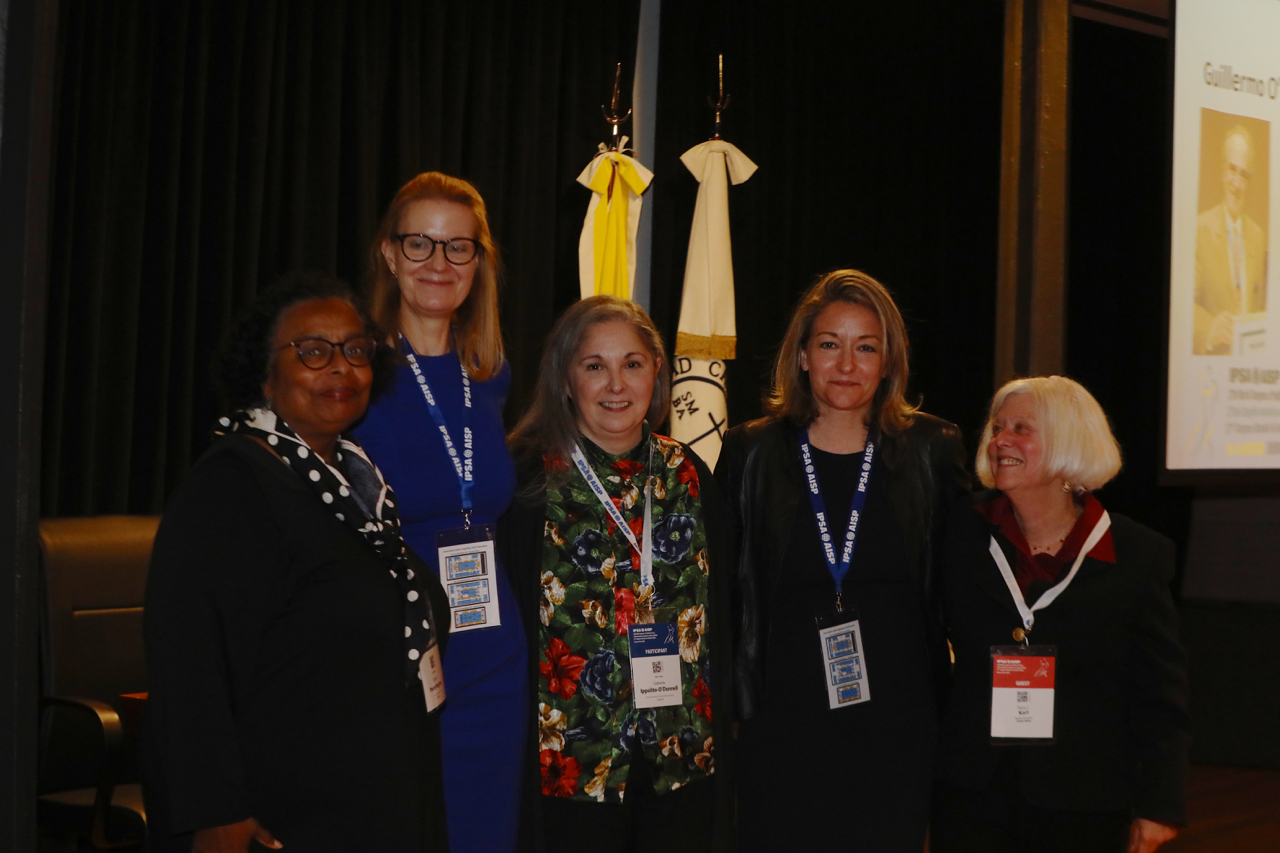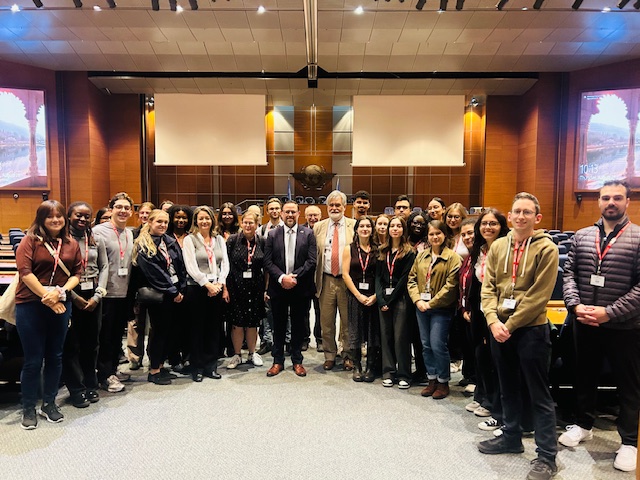

From Theory to Practice: Highlights of the 2025 IPSA-Concordia Summer Institute in Applied Diplomacy
Publication date: Fri, 05 Sep 2025
Photo: Andreas Rendl, Ambassador of Austria to Canada, delivers a keynote address at the IPSA-Concordia Summer Institute.
The 2025 edition of the IPSA-Concordia Summer Institute in Applied Diplomacy was held in a hybrid format in Montréal and virtually from 18 to 28 August 2025. The Summer Institute was offered in person, with the option for students taking non-credit courses to participate virtually via Zoom. A total of 34 participants attended this year’s program.
 Keynote Address by Ambassador Andreas Rendl
Keynote Address by Ambassador Andreas Rendl
The 2025 IPSA-Concordia Summer Institute in Applied Diplomacy kicked off at Concordia University on 18 August 2025, with a keynote address by H.E. Andreas Rendl, Ambassador of Austria to Canada, who delivered a lecture titled Diplomacy in the Digital Age – Still Needed? Drawing on his extensive diplomatic career, Ambassador Rendl offered students an insider’s perspective on the realities of diplomacy. He underscored the central role of human qualities—such as empathy, patience, adaptability, curiosity, and optimism—in building trust and fostering constructive dialogue, noting that these attributes remain indispensable even as technology continues to transform the field. Reflecting on the evolving challenges posed by social media and artificial intelligence, Ambassador Rendl cautioned that while digital tools can facilitate communication, they cannot replace the interpersonal relationships at the heart of diplomacy.
The keynote was followed by a lively Q&A session, where students and audience members engaged with Ambassador Rendl, discussing the challenges of diplomacy and current international issues. The keynote was followed by a cocktail reception, where Summer Institute partners and participants, as well as special guests, had the opportunity to network and continue the conversation in a more informal setting.
Photo (from left to right): Monica Schirdewahn (Honorary Vice-Consul of Austria to Canada), Elizabeth Bloodgood (Associate Professor, Department of Political Science, Concordia University), Pascale Sicotte (Dean, Faculty of Arts and Science, Concordia University), Andreas Rendl (Ambassador of Austria to Canada), Kim Fontaine-Skronski (Executive Director, IPSA), and Daniel Salée (Chair, Department of Political Science, Concordia University).
Summer Institute Program
The 2025 IPSA-Concordia Summer Institute in Applied Diplomacy, organized by Dr. Elizabeth Bloodgood (Professor of Political Science, Concordia University) and Dr. Kim Fontaine-Skronski (Executive Director, IPSA), offered a mixture of theoretical and applied sessions on all aspects of diplomacy, along with a hands-on applied Diplomacy Lab where participants formed teams to work on case studies and present policy recommendations on the following topics:
- Will Cities Save Us?, presented by Elizabeth Bloodgood, Associate Professor at the Department of Political Science at Concordia University and Co-organizer of the IPSA-Concordia Summer Institute in Applied Diplomacy;
- How to Make Donors Care, presented by Micheline Ayoub, Chief of Staff, CGIAR: Science for humanity’s greatest challenges; and
- The Arctic Council in Difficult Times, presented by Sarah Cox, Director of Circumpolar Affairs at Northern Affairs Canada and the Canadian Head of Delegation for the Arctic Council's Sustainable Development Working Group.
 On 26 August, IPSA Executive Director, Kim Fontaine-Skronski, and former Canadian Ambassador to the World Trade Organization (WTO), Don Stephenson, presented a session on Trade Negotiations, Past and Present. Dr. Fontaine-Skronski lectured on the WTO and its mandate from a historical perspective, while Mr. Stephenson shared his valuable experience as a negotiator with the WTO and other organizations.
On 26 August, IPSA Executive Director, Kim Fontaine-Skronski, and former Canadian Ambassador to the World Trade Organization (WTO), Don Stephenson, presented a session on Trade Negotiations, Past and Present. Dr. Fontaine-Skronski lectured on the WTO and its mandate from a historical perspective, while Mr. Stephenson shared his valuable experience as a negotiator with the WTO and other organizations.
On 27 August, the participants presented their case study as part of the Diplomacy Lab and the 2025 edition concluded on 28 August with a visit of the International Civil Aviation Organization (ICAO), the only UN specialized agency in Canada, based in Montréal. The group was welcomed by Douglas Scott Proudfoot, Chargé d'Affairs a.i., and Frank Neubauer, Alternate Representative, Permanent Mission of Canada to ICAO.
Photo: Group photo during the visit to the International Civil Aviation Organization (ICAO).
Guest Lecturers 2025
*in order of appearance
- Elizabeth Bloodgood, Associate Professor, Department of Political Science, Concordia University
- Kim Fontaine-Skronski, IPSA Executive Director
- Daniel Laqua, Head of Research and Knowledge Exchange (History), Associate Professor of European History, Northumbria University
- Justice Sean Harrington, Former Federal Judge
- H.E. Andreas Rendl, Ambassador of Austria to Canada
- Helga Pritz, Consul General of Hungary in Montréal, and former Hungarian Ambassador to Algeria
- Daniel Lacroix, Director, Quebec Diplomacy Institute, Ministry of International Relations and Francophonie (MRIF)
- Véronique Lamontagne, former Executive Director of Lawyers without Borders, former Director of the Office of International Relations of the City of Montreal and Senior Advisor and co-founder of the Mayors Migration Council
- Yolanda Spies, Director of the Diplomatic Studies Programme, University of Oxford
- Micheline Ayoub, Chief of Staff, CGIAR: Science for humanity’s greatest challenges
- Geoffrey Kelley, former Québec Minister for Indigenous Affairs (2014-2018)
- Chief Ghislain Picard, former Chief of the Assembly of First Nations Quebec-Labrador, (1992-2025)
- Natalia Grincheva, Arts Management, Lasalle College of the Arts, University of the Arts Singapore
- Sarah Cox, Director of Circumpolar Affairs at Northern Affairs Canada and Canadian Head of Delegation for the Arctic Councils Sustainable Development Working Group
- Tina Shih, Trade Commissioner, Global Affairs Canada
- Sean Clark, Consul & Senior Trade Commissioner, Consulate General of Canada in Denver
- Mathieu Ouimet, Professor at Laval University and Executive Director of the International Francophone Network on Scientific Advice (Réseau francophone international en conseil scientifique)
- Nicolas Reuge, Senior Executive Officer, UNESCO Institute of Statistics
- Howard Mann, Environmental Lawyer
- Tomas Hatala, PhD Candidate, Carleton University
- Corneliu Bjola, Professor of Diplomatic Studies, University of Oxford
- Don Stephenson, Former Canadian Ambassador to the WTO
- Douglas Scott Proudfoot, Chargé d'Affairs a.i., Permanent Mission of Canada to ICAO
- Frank Neubauer, Alternate Representative, Permanent Mission of Canada to ICAO
.jpg) Student Testimonials on Ambassador Andreas Rendl's Keynote
Student Testimonials on Ambassador Andreas Rendl's Keynote
The keywords empathy, confidence, patience, and optimism resonated with me the most, as they challenged some of the common perceptions we might have about diplomatic work. In today’s world, these qualities are rare and precious, often undervalued in many professions and even seen as risky by the more pessimistic among us. Hearing from Mr. Rendl’s experience that such traits define a strong state representative was both refreshing and encouraging.
Diplomacy has never been more relevant. During his presentation, Ambassador Rendl highlighted how technology has transformed—and continues to shape—how countries negotiate. Yet nothing can replace human relationships and interpersonal communication in navigating these complexities. While digital tools can be used for both good and bad, we must not underestimate the importance of diplomacy in the digital age, especially as we work together to address challenges like misinformation and other global crises.
Ambassador Rendl delivered his talk with warmth and humour, offering the audience valuable advice on the qualities he sees as essential for success in diplomacy—curiosity, respect, trust, patience, and optimism. He concluded his speech by noting that diplomats are among the happiest people in their profession. After hearing his words, I didn’t need any convincing—where do I sign up?
I thoroughly enjoyed Ambassador Rendl’s frank advice on what it means to be an effective diplomat. The keywords he highlighted resonated strongly with me: respect, confidence, truth, patience, and always optimism. I also appreciated his honesty about the more challenging aspects of diplomatic work—where successes are often fewer than failures—and I was inspired by his reflections on the important and rewarding service he has provided.











